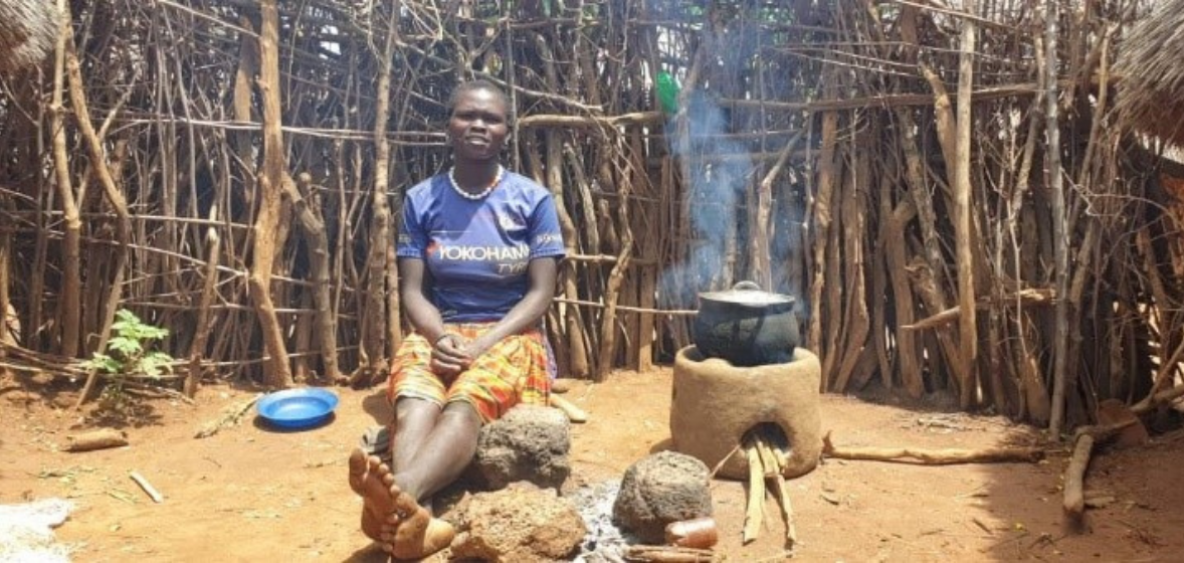 Natuk Paulina with a cookstove she made (Credit: GARD 2020)
Natuk Paulina with a cookstove she made (Credit: GARD 2020) A community of smallholder farmers in the Karamoja sub-region of Uganda have come together and enthusiastically adopted a new way of cooking that promises to lessen pressure on adjacent forests and create a safer space for women.
Among the Karamojong people of Uganda, any activity associated with cooking - except roasting meat - is traditionally considered a women’s role, and that extends to collecting firewood.
Now, under the Resilient Food Systems (RFS) programme Uganda project, Fostering Sustainability and Resilience for Food Security in the Karamoja sub-region (F-SURE), women and men are breaking both barriers and bread with the help of fuel-efficient, mud cookstoves to reduce pressure on forests and save women’s time searching for firewood.
The F-SURE project is implemented by the government of Uganda through the Ministry of Agriculture Animal Industry and Fisheries (MAAIF) with technical and financial support from the United Nations Development Programme (UNDP) and the Food and Agriculture Organisation of the United Nations (FAO) and co-implemented by the Grassroots Alliance for Rural Development (GARD) among other partners. Part of the scope of the project involves participatory identification of issues linked to food security and actions to address them. During this process, wood-saving cook stoves were identified as one of the most sought-after techniques that people wanted to learn to construct and use in Lologoka Village, Kotido district, with community elders being the first champions to embrace them for warming their huts at night.
“The Mud-stove is one of the most important things GARD has taught us,” said Lokoru Ferucho, an elder and also Lologoka Village Council Leader. “Imagine had it not been because of the introduction of these stoves, the whole parish of Lologoka would have been exposed to the risk of insecurity of cattle rustling.” Lokoru Ferucho explained that normally during the rainy season, women are forced to utilize some of the wood that makes up manyatta fences and livestock kraals for cooking. Then during the dry season, new wood is harvested from the wild and the fences are mended. “Our fences were saved this season because few firewood was required; our trees have also regenerated quickly and the whole place is now green compared to other villages not using the stoves. I am going to advocate for the adoption of this technology by all households in this manyatta,” he said.
In total, 590 mud stoves were made during the initial training in the 6 project manyattas, and their benefits are immeasurable when it comes to fostering safety for women since they no longer need to go far to fetch firewood.
Natuk Paulina, a single mother in Lologoka Village, Kotido district in Karamoja, is one of the beneficiaries of the cookstove project activities. While she remembers seeing plentiful firewood in her childhood, drought, flooding, and pressure from the charcoal and firewood trade have made it harder and harder to find wood for cooking. “The situation has been worsened by the recent re-emergence of conflict, as women can no longer move to far distance to fetch water or firewood due to the risk of rape and sexual gender-based violence” she added.
With the traditional three-stone fire stove that was the mainstay before the project, people required 3-4 bundles of firewood per week to cook, costing about UGX 15,000 - 20,000 (USD 4-5). Now with the mud stoves, only 1-2 bundles are needed because of the slow burn rate the stove produces - and a lessened amount of smoke is an added and very welcome bonus. “It has made it possible for us to comfortably cook inside the house both during the day and at night. We collect firewood less often and that is less stressful. Also, the introduction of cooking stoves has significantly reduced the incidences of wildfire outbreaks which were common during the dry windy seasons in Manyattas,” says Paulina. She added that “with the cook stoves, you can light and leave it with the children without any worry of burns of children or a home. With cooking stoves, we are safe”.

The community-level training was attended by
women, men and children, all eager to learn how to create this valuable
addition to their livelihoods, which they can now replicate for sale to others.
Community elder Muzee Apanabere noted that “[he had] realized that when men and women work together, work becomes less tiresome and quicker”. Wise words from a wise man.
Subscribe to our monthly newsletter to receive updates on stories directly from the field across all our projects, upcoming events, new resources, and more.